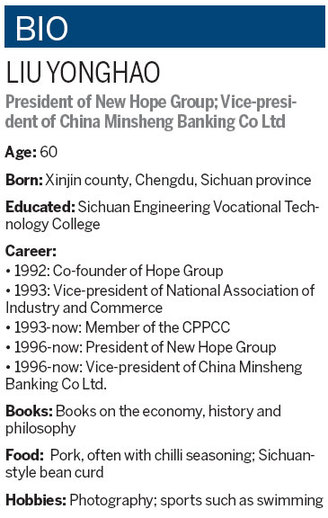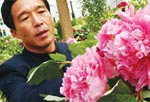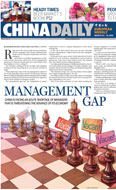Fields of hope
Updated: 2011-03-11 10:56
By Hu Haiyan (China Daily European Weekly)
A top Chinese entrepreneur wants to expand his already large agribusiness
If you were seated next to Liu Yonghao in economy class in an aircraft, you would hardly think he is a billionaire and one of China's top entrepreneurs. More likely, Liu would be in a T-shirt, rather than in a business suit, and would have chosen to fly on a discounted economy class ticket.
 |
|
Liu Yonghao grabs the media spotlight at the ongoing annual session of |
Of course, Liu could have first class if he wanted to. After all, he owns one of China's largest feed producing and agribusiness companies, New Hope Group, which he established in 1996.
Last year, New Hope sold 14 million tons of feed, the third highest in the world, and had a revenue of more than 60 billion yuan (6.5 billion euros).
It is one of the largest suppliers of meat, eggs and dairy products in China, providing more than 200 million poultry and half a million tons of milk each year. It also processes 8.5 million pigs each year.
And New Hope Group is the largest shareholder of China Minsheng Banking Co Ltd, with almost 80 percent of its annual profits coming from Minsheng. It also set up New Hope Financial Company at the end of 2010.
"The reason for leading a simple life is the fact that I started from scratch," Liu says.
Born in 1951 to a poor family with many children in Xinjin county, Chengdu of Southwest China's Sichuan province, Liu didn't even have his own shoes until he was 20.
After completing his studies at a vocational technical college, Liu started to work as a teacher. His three brothers had jobs in the government or State-owned companies. But the family remained poor.
To enable them to have some meat to eat in the Spring Festival, the four brothers quit their government jobs and sold their watches and bicycles to raise 1,000 yuan to start a business in Sichuan province's countryside in the early 1980s at the outset of China's economic reforms.
They bred and sold quails very successfully, and within six years they had amassed 10 million yuan and branched into the animal feed business, establishing the Hope Group in 1992.
Four years later, the brothers decided to go their own way, and Liu set up the New Hope Group, which now employs 66,000 people and operates more than 400 factories in China and abroad.
Despite his wealth, Liu prefers the simple life and drove a Volkswagen Santana for years until his employees insisted he buy a Mercedes-Benz. He has not changed his hairstyle for years and always goes to the same barbershop, and his favorite food is pork, often with chilli seasoning.
The soft-spoken Liu seldom berates others, and always has a smile. "My employees will not feel pressured when talking with me," says Liu, who is president of New Hope.
 |
Liu, who does not drink or smoke and shows no interests in brand names, had refused many offers from publishers to write his biography. It was not until he found some fake versions of his life beginning to circulate that he invited an author to write a book about his life.
"I still have so many things to do, and I think it is not the time to write a biography, but I don't want others to be misled by some fake versions of my life experience," Liu says.
Liu says his turning point came in 1993 when he joined the Chinese People's Political Consultative Conference (CPPCC), China's top political consultative body, as a representative of the private sector. That year, he was appointed vice-president of the All-China Federation of Industry and Commerce.
These positions provided him with opportunities to make friends with entrepreneurs across the nation and the world.
"It gave me lot of opportunities to communicate with outstanding entrepreneurs and experts. It was an eye-opening experience," Liu says. "Not all entrepreneurs have these kinds of opportunities."
While Liu is no longer the federation's vice-president - a person can serve only two consecutive terms of office - he is still in charge of the economics committee of the CPPCC, which gives him the chance to meet and learn from economists.
"I am trying to learn more about China's macro economy to develop a more sophisticated way of thinking," he says.
Liu is a workaholic, spending more than 12 hours a day at work and most of his spare time reading. And once he thinks he has come across some meaningful and useful points, he jots them in a notebook he carries with him, no matter who he is talking to.
Liu is a devoted family man, preferring to return home to have lunch with his wife whenever possible. His daughter, Liu Chang, 30, is also part of New Hope and is on its board of directors.
Despite the success of New Hope Group, Liu is not sitting still. Last year, the group underwent a restructuring, including injecting good quality assets into the listed company and stripping some non-core business assets out of it.
"The overall listing of New Hope Group's agriculture and animal husbandry assets has been initiated and will be completed during 2011," Liu says. "And then New Hope Group will have the largest market value among the domestic enterprises in the fields of agriculture and animal husbandry.
"We want to promote the development of our agricultural industry through combining capital and industry.
"We will make good use of two channels of 'listed company' and 'finance company' to provide financial support to the development of agricultural and animal husbandry industries.
"As a result, a more comprehensive industrial chain, including the construction of the terminal market and wholesale market, can be established."
And the group is looking further afield, joining forces with the Zhongshan-based Agria Corp to buy a 50.1 stake of PGG Wrightson, New Zealand's largest agricultural services provider, with its grass seeds business ranking first in the southern hemisphere.
The aim is to promote the seed industry development of New Hope Group, Liu says.
Zhang Tianli, a partner of New Hope Group's Industry Fund, says: "The volume of the deal is about $200 million. The deal is waiting for the approvals of the governments of New Zealand and China. If it goes smoothly, it can be done by the end of April."
This is New Hope Group's first venture overseas through an acquisition or merger. But as early as 1996, New Hope expanded overseas and now operates 12 feed factories in Vietnam, Cambodia, the Philippines, Indonesia and Bangladesh.
Liu says although New Hope also invests in finance and real estate, its core business is still agriculture. "Our target in the next five years is to build our company into a world-class feed producer and agribusiness operator," he says.
To achieve this, Liu is seeking more international experience and wants to learn from success stories overseas such as those from the United States.
"The US is the major producer and exporter of bean and corn, while China is the major importer," he says. "And the US possesses advanced agricultural technologies and complete industrial chains, which are worth learning for Chinese."
Liu says that over the next five years, New Hope will build 15 to 20 more factories overseas, generating sales of more than 2 billion yuan and profits of 200 million yuan.
"My time is divided into three parts. The first is for the dealing with the critical issues of New Hope Group, the second for learning from the first-class talents, the third for researching on the development of our enterprise," he says.
"In the past, you could easily gain business success once you were diligent enough, yet now, you have to work hard, have good personal relationships and always keep learning.
"There is still a long way to go for us to become a world-class agricultural enterprise, but we are sure we will accomplish it in the future."
E-paper

Rise and shine
The Chinese solar energy industry is heating up following recent setbacks in the nuclear sector
Bombs aim for regime change
CSI, with a twist
Literary path
Specials

Peony express
Growers of china's unofficial national flower are reaching out to europe for help

Tea-ing up
More turning to Chinese tea for investment opportunities like vintage wine

A cut above
The ancient city of Luoyang is home to a treasure trove of cultural wonders.
